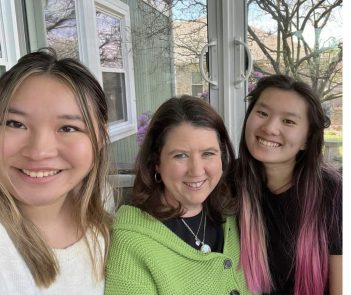A new addition to the Hamilton Southeastern Schools student handbook addresses microaggressions without punishing students who violate it. Instead, the new language is designed to facilitate conversations between students and administrators, teachers or guidance counselors to address why what was said could cause harm.
The addition defines microaggressions as indirect intentional, or unintentional, discrimination against people of marginalized groups. The new handbook language has been mostly accepted by members of the HSE community, but some people disagree with the new wording and have expressed displeasure on social media platforms.
The handbook states: “Microaggressions can be defined as every day, subtle, intentional or unintentional interactions or behaviors that communicate some sort of bias toward stigmatized, or culturally or historically marginalized groups. While Hamilton Southeastern understands those individuals communicating a microaggression might not intend to express bias, the school recognizes the responsibility to educate students on the reality of bias perceptions. Issues regarding microaggressions may be addressed through restorative conversations led by school administration, teachers, and/or guidance counselors rather than punitive measures. Habitual occurrences could lead to consequences applicable to inappropriate conduct as defined in Section 28.”

One parent who supports of the new addition is Bethann Buddenbaum, a mother of two Hamilton Southeastern High School graduates. She said her two daughters, who she and her husband adopted from China, are often “treated as white” when around their white parents. However, when they are on their own, they are “treated as Asian.”
Her daughters, Fiona and Emma Reese, graduated from Hamilton Southeastern in 2017 and 2020, respectively. Buddenbaum said both of her daughters experienced microaggressions while attending HSE. She said while some interactions were intentionally mean spirited, like asking if they enjoyed eating dog or cat, other instances were unintentional, such as being asked about China’s one-child policy because she was the only Asian person in the class.
Buddenbaum said she is glad the school is addressing microaggressions in the new handbook and noted the backlash from social media is unnecessary.
“The manufactured anger over this handbook addition is disappointing, to say the least. It demonstrates a lack of empathy for others, which includes race, gender, sexual orientation and disability,” Buddenbaum said. “And that is exactly what this addition to the student handbook is seeking to do — help students understand that words matter.”
HSE released a statement saying that it strives to prepare its 21,000 students both academically and behaviorally but wouldn’t comment beyond the statement, which reads:
“We believe it is important to ensure our students are prepared for the ever-changing real world. and how to navigate successfully in this new environment in which we all operate. The recent update to our student handbook provides staff the opportunity to hold restorative conversations about how an intentional or unintentional interaction that communicates some kind of bias between students can be effectively addressed.”
One person who does not support the new language is Diane Eaton, a community member who served on the HSE school board from 2006 to 2014. She the board should make decisions based on facts, and the school had no facts or statistics to justify updating the handbook.
“I do not believe they showed any data, and the school board should be data-driven,” said Eaton, adding that the school board should focus on raising academic scores and statistics.
School board member Michelle Fullhart, who has served on the board since 2015, supported the new wording when it was brought to the board. Although she declined to comment to Current directly, she did provide a statement from her personal Facebook page.
“The reason for adding the wording is so students who may not understand they are showing bias unintentionally, or those who do intentionally, understand that their careless use of words or actions have an impact on others, and affects the learning environment,” the post reads.
The updated handbook was approved at a June 8 school board meeting and went into effect Aug. 5 at the start of the school year.




